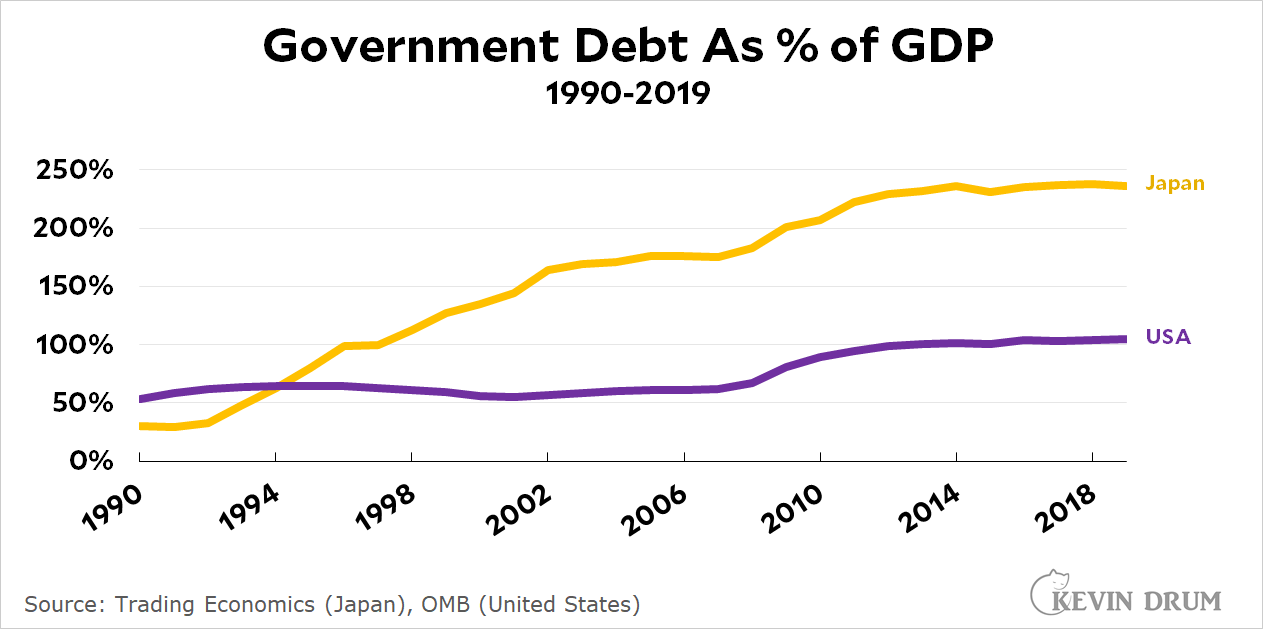The National Debt Is . . . Complicated
Category: News & Politics
Via: john-russell • 3 years ago • 4 commentsBy: Author Kevin Drum (Kevin Drum)



How much government debt is too much? This is once again a live subject because President Biden's coronavirus bill will cost $1.9 trillion—on top of the $3.5 trillion we've already spent—and at least a few economists worry that we're adding to our debt too fast, which could bring on a bout of high inflation.
Now, even the cautious economists mostly agree that the risk of doing too little is greater than the risk of doing too much. So if we're unsure, then the full $1.9 trillion is the way to go. Progressive pundits pretty unanimously agree.
And so do I. On the other hand, I'm a little nervous about the seemingly casual attitude among some progressives about government debt. It's one thing to (maybe) overspend during an unprecedented pandemic, but it's another thing to shrug your shoulders and basically say that debt doesn't matter and we should all get over it. And if inflation heats up, hey, all we have to do is engineer a recession to show it who's boss, just like Paul Volcker did. This all seems just a little too world-weary to me.
On the third hand, there's this:

Japan has had massively higher debt than the US for the past two decades, and the price they've paid for this is . . . close to nothing. Japan, like the US, issues its own currency, which helps, and they have a culture of saving that supports their debt. The US, however, has not just its own currency, but the best, most desirable currency in the world. Also, our debt service is low; we have no trouble selling all the treasury bonds we want; and not only is inflation low, but inflationary expectations are low too. So, if anything, it seems we're even better placed than Japan to support a far higher debt load than we currently have.
Beyond this, there are lots of econometric arguments about what levels of debt are sustainable, and obviously I don't have the chops to referee this. Still, while I retain an old-school feeling that we should take the national debt seriously, there's always Japan sitting around telling me not to worry so much. We have a very long way to go before our national debt becomes a serious problem.






We should not fail to properly address the economic pain of the pandemic by using the "national debt" as the rationale for doing less than necessary.
Catherine Rampell of the Washington Post, who specializes in economic news, wrote yesterday that unemployment is actually double the announced figure of 6.3%, primarily because so many people have given up looking for work and are not counted in official unemployment numbers.
Who cares about the debt. We need to fund all the worthwhile projects and programs for current needs of our citizens and quit worrying about our great, great, great.......grand kids having to pay it all off.
Let's get it on with the Green New Deal, permanent unemployment benefits, free tuition and tuition forgiveness, free services and stimulus checks for illegal immigrants.....all the while we continue to fight the coming catastrophe of climate change.
The Republican Mitt Romney has proposed an even larger sum for that same purpose.
Remember when the Iraq war was bankrupting the country....
Good times.
Biden’s giveaway of $1400, alone, ignoring all the other trillions we’ve borrowed to stimulate the economy, will cost more than the first four years of the Iraq war combined.